
TRANSPORTATION
Scope & Guideline
Advancing Knowledge in Transportation Studies
Introduction
Aims and Scopes
- Electric Vehicle Technology and Performance:
Research on advancements in electric vehicles, including their design, performance, and integration with renewable energy sources. - Battery Systems and Management:
Focus on the development, management, and enhancement of battery technologies, particularly lithium-ion and solid-state batteries, including their safety, efficiency, and lifecycle management. - Sustainable Transportation Solutions:
Exploration of sustainable practices in transportation, including the integration of electric vehicles, hybrid systems, and alternative fuels to reduce carbon footprints. - Energy Management and Optimization:
Studies on energy management strategies for electric and hybrid vehicles, including charging infrastructure, energy storage solutions, and vehicle-to-grid technologies. - Safety and Reliability in Transportation Systems:
Investigation into the safety, reliability, and regulatory aspects of transportation technologies, particularly concerning battery safety during thermal events and mechanical failures.
Trending and Emerging
- Electric Vehicle Charging Infrastructure:
Recent publications emphasize the optimization of charging station placement and management, driven by the growing adoption of electric vehicles and the need for efficient energy distribution. - Advanced Battery Technologies:
A surge in research on lithium-ion and solid-state batteries, particularly regarding their efficiency, safety, and longevity, reflects the ongoing quest for better energy storage solutions. - Artificial Intelligence and Machine Learning in Transportation:
Increasing use of AI and machine learning techniques for predictive maintenance, energy management, and battery health diagnostics showcases the integration of advanced technologies in transportation research. - Battery Recycling and Second-Life Applications:
A growing interest in the recycling of lithium-ion batteries and exploring second-life applications indicates a trend towards sustainability and resource efficiency in battery management. - Thermal Management and Safety Mechanisms:
Enhanced focus on thermal management systems and safety mechanisms for batteries, particularly in preventing thermal runaway and improving overall safety in electric vehicles.
Declining or Waning
- Traditional Internal Combustion Engine Technologies:
Research related to internal combustion engines has seen a decline as the focus shifts towards electric and hybrid systems, reflecting the industry's move towards sustainability. - Conventional Battery Technologies:
The exploration of traditional lead-acid and other non-lithium-based battery technologies is waning, as research increasingly prioritizes advanced lithium-ion and solid-state battery systems. - General Transportation Infrastructure Studies:
Broad studies on transportation infrastructure without a specific focus on electric or alternative fuel technologies have become less prominent, as more targeted research emerges.
Similar Journals

Journal of Power Sources Advances
Unleashing Potential in Energy Engineering and Materials ChemistryJournal of Power Sources Advances, published by ELSEVIER, stands at the forefront of innovative research within the fields of Electrochemistry, Energy Engineering and Power Technology, and Materials Chemistry. Having established itself as an Open Access journal since 2020, it aims to disseminate knowledge rapidly and widely among researchers, professionals, and students interested in the latest advancements in power sources technology. With an impressive impact factor and recognition as a Q1 journal in 2023 across multiple categories, it addresses key challenges and innovations in energy generation, storage, and materials development. The journal's commitment to high-quality, peer-reviewed content fosters a vibrant community for discussing breakthroughs that hold the potential to transform energy systems globally. The journal operates out of the Netherlands, enhancing its global outreach, while its strong Scopus rankings highlight its influential role in driving research within its scope. Journal of Power Sources Advances is the pivotal resource for those dedicated to shaping the future of energy sustainability and technology.
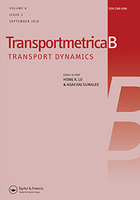
Transportmetrica B-Transport Dynamics
Elevating Scholarship in Transportation ModelingTransportmetrica B: Transport Dynamics is a premier academic journal published by Taylor & Francis Ltd, focusing on innovative research in the fields of transportation dynamics, modeling, and simulation. Established in 2013 and running through 2024, this journal holds a prestigious Q1 ranking in Modeling and Simulation, Software, and Transportation categories, reflecting its commitment to high-quality scholarship. With an impactful presence, evidenced by its Scopus rankings—73rd in Mathematics, 57th in Social Sciences, and 174th in Computer Science—Transportmetrica B serves as a critical platform for researchers, professionals, and students seeking to explore and disseminate groundbreaking findings in transport dynamics. The journal is accessible via open access options, ensuring that its valuable insights reach a global audience. As the field of transport continues to evolve, Transportmetrica B remains at the forefront, championing extensive research and development that address the challenges of modern transportation systems.
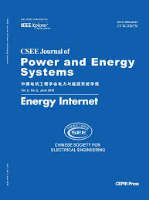
CSEE Journal of Power and Energy Systems
Bridging Disciplines for a Greener TomorrowCSEE Journal of Power and Energy Systems is a leading peer-reviewed academic journal published by the China Electric Power Research Institute, dedicated to advancing innovations in the fields of electrical and electronic engineering, energy systems, and materials science. With an impressive impact factor and recognition as a Q1 journal in its respective categories in 2023, it ranks among the top in Electrical and Electronic Engineering, Electronic, Optical and Magnetic Materials, and General Energy, showcasing its critical role in disseminating high-quality research. Since its transition to Open Access in 2015, the journal has made significant scholarly work freely accessible to researchers, professionals, and students globally, promoting collaboration and knowledge sharing across disciplines. The journal invites contributions that address contemporary challenges and innovations in power and energy systems, reflecting its commitment to supporting the sustainable development of energy resources and technologies.

Carbon Energy
Catalyzing interdisciplinary collaboration for global energy challenges.Welcome to Carbon Energy, an esteemed open-access journal published by WILEY that focuses on cutting-edge research in the field of energy and materials science. Since its inception in 2019, this journal has quickly established itself as a leading platform for disseminating impactful findings and innovations related to carbon-based energy solutions, renewable resources, and sustainability practices. With its impressive Q1 rankings in multiple categories—including Energy (miscellaneous), Materials Chemistry, and Renewable Energy—Carbon Energy is recognized for delivering high-quality, peer-reviewed content that meets the rigorous standards of the academic community. Through its open-access model, the journal ensures wide accessibility of research findings, making it an invaluable resource for researchers, professionals, and students alike. As we look toward the future, Carbon Energy aims to further its mission of advancing sustainable energy technologies and promoting interdisciplinary collaboration in tackling global energy challenges.
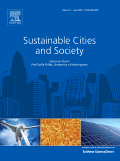
Sustainable Cities and Society
Pioneering insights for thriving, sustainable societies.Sustainable Cities and Society is a premier journal published by Elsevier, focusing on the interdisciplinary nexus of urban development, sustainability, and environmental challenges. With an impressive impact factor and recognized as a Q1 journal in multiple categories—including Civil and Structural Engineering, Geography, Planning and Development, Renewable Energy, Sustainability and the Environment, and Transportation—this journal stands out as a crucial platform for researchers, practitioners, and policymakers. The journal has been dedicated to advancing knowledge since its inception in 2011 and continues to be a vital resource for innovative solutions that foster sustainable urban environments. By featuring high-quality research, case studies, and reviews, it serves as an essential reference point for contemporary issues in urban planning and sustainable development. The journal's commitment to excellence is evident in its rankings, and it remains a go-to source for those invested in creating cities that are resilient, eco-friendly, and socially equitable.

Journal of the Japan Institute of Energy
Advancing Sustainable Energy Solutions.Journal of the Japan Institute of Energy, ISSN 0916-8753, is a reputable academic journal dedicated to the field of energy studies, reflecting the dynamic and evolving landscape of energy research. Published by the Japan Institute of Energy, the journal serves as a platform for disseminating innovative research, technologies, and methodologies related to energy engineering, renewable energy sources, and sustainability practices. While this journal does not currently offer open access, it remains a vital resource for professionals, researchers, and students alike, particularly those focused on advancing knowledge within Energy Engineering and Power Technology, Fuel Technology, and related areas. As of 2023, it is ranked in the Q4 quartile across several categories in Scopus, which highlights its foundational role in fostering scholarly discourse, despite its lower ranking in the competitive global landscape. Established in 1990 and continuously evolving, the journal provides insights into the challenges and innovations in the energy sector, making it an essential read for anyone invested in the future of energy solutions.
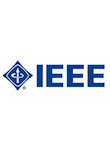
IEEE Transactions on Transportation Electrification
Empowering the Future of Electric MobilityIEEE Transactions on Transportation Electrification, published by the IEEE-Institute of Electrical and Electronics Engineers, is a premier journal dedicated to advancing the field of transportation electrification. With its ISSN of 2332-7782, this journal has established itself as a key resource in the domains of Automotive Engineering, Electrical and Electronic Engineering, Energy Engineering and Power Technology, and Transportation, earning prestigious Q1 quartile rankings across these categories in 2023. Covering a wide scope, it publishes high-quality research from 2015 to 2024, appealing to researchers, professionals, and students alike. The journal seeks to provide a platform for innovative ideas and technologies that rigorously address the challenges of electrification in the transportation sector, thereby contributing significantly to sustainability and efficiency in modern transport systems. With high Scopus rankings—ranked 8th in Automotive Engineering and 26th in Energy Engineering—this journal is an essential publication for those looking to stay at the forefront of transportation electrification and its implications for future energy systems.
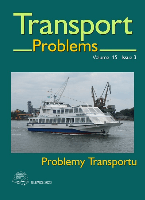
Transport Problems
Navigating the Intersection of Theory and Practice in TransportTransport Problems, published by the Silesian University of Technology, Faculty of Transport, is a distinguished open-access journal that has been advancing scholarship in the fields of Automotive Engineering, Mechanical Engineering, and Transportation since its inception in 2007. With an ISSN of 1896-0596 and an E-ISSN of 2300-861X, this journal serves as a vital platform for researchers and practitioners to disseminate innovative research findings and explore fundamental issues in transport systems and technologies. Based in Poland, the journal covers various topics including transportation logistics, vehicle dynamics, and environmental impacts, thereby addressing critical challenges faced in the transportation sector globally. As reflected in its Scopus rankings, the journal occupies respectable quartiles and continues to contribute valuable insights to the academic community. By making its content freely accessible, Transport Problems significantly enhances the ability of researchers and students alike to engage with the latest developments in transport engineering and contribute to this ever-evolving field.
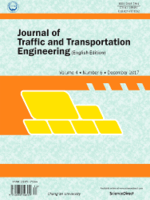
Journal of Traffic and Transportation Engineering-English Edition
Connecting Research and Practice in Traffic Engineering.Journal of Traffic and Transportation Engineering-English Edition, published by KEAI PUBLISHING LTD, is a leading open-access journal that has been disseminating valuable research in the realms of civil and structural engineering, as well as transportation studies since 2014. With a robust impact factor reflected by its prestigious Q1 rankings in both Civil and Structural Engineering and Transportation, this journal stands at the forefront of innovation and scholarship, featuring contributions from experts across the globe. The journal is particularly noted for its practical and theoretical advancements in traffic and transportation engineering, making it indispensable for researchers, industry professionals, and students aiming to deepen their understanding of these critical fields. Dedicated to providing a platform for high-quality interdisciplinary research, the Journal of Traffic and Transportation Engineering embraces the principles of open access, ensuring that all published articles are freely available to foster knowledge sharing and collaboration within the community. With its headquarters located in Beijing, China, the journal continues to push boundaries and set new standards in the field of traffic and transportation research.

International Journal of Energy and Environmental Engineering
Uniting Expertise for a Sustainable Energy LandscapeInternational Journal of Energy and Environmental Engineering, published by SPRINGER HEIDELBERG, is a leading platform for innovative research in the fields of energy and environmental engineering. With an ISSN of 2008-9163 and an E-ISSN of 2251-6832, this journal is dedicated to advancing knowledge and technology that intersects both energy and environmental disciplines. Recognized in the Q2 category for 2023 in both Energy (miscellaneous) and Environmental Engineering, this interdisciplinary journal aims to address global challenges in energy sustainability and environmental protection. The journal also boasts strong Scopus rankings, standing at Rank #73 in Environmental Science and Rank #28 in General Energy, highlighting its influential role within the academic community. Researchers, professionals, and students are encouraged to contribute and engage with cutting-edge studies that push the boundaries of knowledge and innovation in energy and environmental engineering.